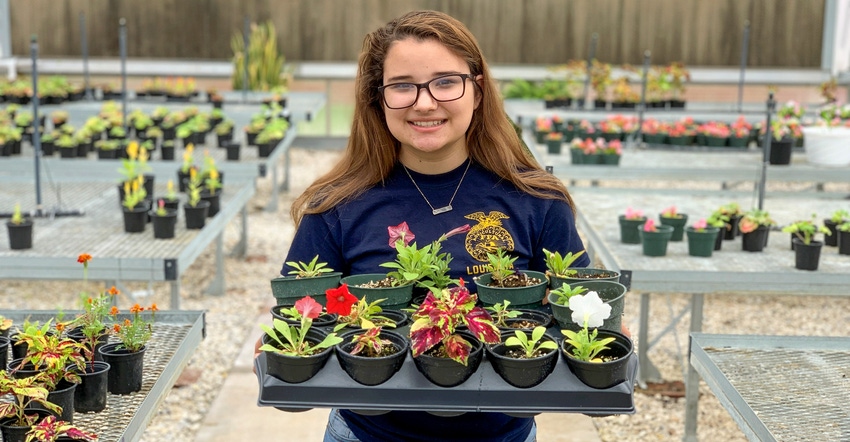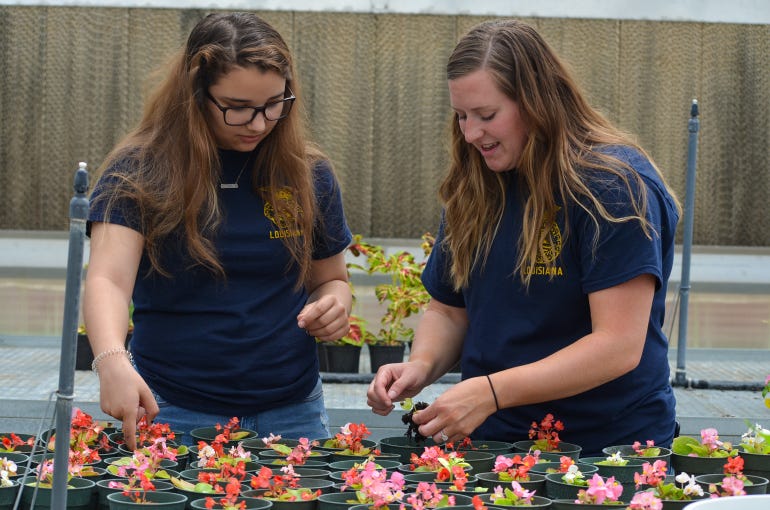
Louisiana FFA members put a few smiles on the faces of COVID-19 front-line workers as they delivered flowers to their community hospital, nursing homes and firehouse.
“We wanted to give back since our community helps us so much,” says Jaidyn Wommack, a junior and current Louisiana FFA vice president. “We want to help them in times like these.”
The idea of donating flowers from the FFA greenhouse to those serving within their community came during an officer Zoom meeting. The Louisiana school district, like others across Missouri, remains closed because of the coronavirus, causing student-led chapters to conduct business differently.
Related: Complete coronavirus coverage
During the virtual meeting, Wommack volunteered to contact the town’s two nursing homes — Lynn’s Heritage House and Maple Grove Lodge Nursing Home — the Pike County Memorial Hospital and the Louisiana Fire Department to set up drop-off times. She received help from chapter treasurer Caitlyn Gloe.
“At both of the nursing homes I couldn't go in, but somebody came to the door, and you could tell it made their day,” Wommack says. “And at the hospital, they had bright smiles. It was really nice to see.”
Change to plant sales
For many FFA chapters, spring is the time for greenhouse sales. Chapters look at the event as a fundraiser for expenses and trips. However, the coronavirus put a damper on this tradition.
In a normal year, visitors could walk between tables and select their favorite plants. This year, a few schools, such as Louisiana High School, allowed customers to shop in-person while observing the social distancing and safety measures put out by the Centers for Disease Control. Other campuses resorted to drive-up service, where FFA advisors or a few members filled orders and brought them to the car.
Louisiana FFA advisor Lindsey O’Hara says despite the changes to sale procedures, residents in the small northeast Missouri community located along the banks of the Mississippi River came out and supported FFA members.
“They’ve been great,” she says. “I wasn’t sure what to expect. I was a little concerned because school was closed and people aren’t getting out as much, but it turned out better than I imagined.”
Student-run greenhouse
For the first-year agriculture instructor, this year has been anything but normal. The Louisiana school district was on spring break when COVID-19 first garnered national attention.
“We were set to come back to school when it hit,” O'Hara says. The district decided to remain closed. She was left with a greenhouse was full of more than 1,000 plants at various stages of growth, all needing attention.
Her students started planning for the greenhouse project in December. The class instructed students not only on how to care for plants, but also how to run a business. With only 17 students in the horticulture class, it took the entire chapter to care for the flowers and produce.

TEACHABLE MOMENT: Times of crisis offer first-year FFA advisor Lindsey O’Hara (right) the opportunity to help her students live out the FFA motto, showing them that service in a small town is what builds community.

“It was a completely student-led project,” O’Hara explains. Students selected a greenhouse manager and created a financial department that set plant prices. FFA members even developed work schedules. They planted trays and started caring for them.
“I take my hat off to them because it was hard work in here,” she says, “making sure that the pots had enough soil and watering.” While the greenhouse does have an automated watering system, it is not turned on for the first few weeks as plants are closely monitored. “It was all done by hand,” she adds.
O’Hara says her students were like a “well-oiled machine” before COVID-19 struck.
Fruits of labor
With a stay-at-home order in place for the state, no longer was it a group project with many hands. The number of students in the greenhouse dropped to zero.
For the most part, it was O’Hara tending to the plants. She wanted to make sure the students’ efforts did not go to waste. “They worked so hard to make sure this was a success,” she says.
When April rolled around and the plants were ready for sale, she could no longer ask the entire class or even those students on the schedule to come in to the greenhouse. “We had to resort to teachers filling in,” she adds. And that part was tough.
“It was really sad that my students weren't able to see all the people that came through in here and how excited they were and hear all the compliments,” she explains. Determined to connect customers' comments with kids, she shared them virtually through Google Classroom and social media.
“I wanted them to see just the impact that they've had on people in their community, the positivity they brought to people who were so excited about all their work and what came from their work in the greenhouse," O'Hara says.
Still, the FFA members felt it was important to serve their community during this time of crisis. So Wommack and Gloe, along with their advisor, set out to spread some joy, even if just for one day.
Wommack feels fortunate to witness firsthand the smiles of residents, health care workers and emergency response personnel in her community. “It is amazing what just a few bright flowers can do for people,” she says.
Read more about:
Covid 19About the Author(s)
You May Also Like






